- Home
- Nicholas Sparks
The Wish Page 16
The Wish Read online
Page 16
But it wasn’t a photo of me; instead, it was the photograph I’d loved, the one of the lighthouse and the giant moon. Like me, Aunt Linda and Gwen were stunned by the image; they both agreed it should hang in my room where I could see it while lying in bed.
With the gifts opened, we visited for a little while, until Gwen announced that she wanted to go for a short walk. Aunt Linda joined her at the door and we watched while they bundled up.
“Are you sure you don’t want to join us?” my aunt asked. “To help digest dinner before the rain comes back?”
“I’m okay,” I said. “I think I’d just like to sit for a while, if that’s all right.”
She finished wrapping the scarf around her neck. “We won’t be gone long.”
After they left, I looked from the photograph to the glowing tree, to the candles, and then to Bryce. He was beside me on the couch, not wedged against me but close enough that if I leaned, our shoulders would brush against each other. Music continued to play on the radio and beneath that, barely detectable, was the sound of gentle swells lapping against the shoreline. Bryce was quiet; like me, he seemed content. I thought back to my first few weeks in Ocracoke—the fear and sadness and the ache of loneliness as I lay in my room, the notion that my friends would forget me, and the conviction that being away from home for the holidays was a wrong that could never be righted.
And yet as I sat beside Bryce with the photograph in my lap, I knew already that this had become a Christmas I would never forget. I thought about Aunt Linda and Gwen and Bryce’s family and the ease and kindness I’d found here, but mostly I thought about Bryce. I wondered what he was thinking, and when his eyes suddenly flashed toward me, I wanted to tell him that he’d inspired me in ways he probably couldn’t imagine.
“You’re thinking about something,” Bryce stated, and I felt my thoughts drift away like vapor, leaving only a single idea.
“Yeah,” I said. “I was.”
“Care to share?”
I glanced down at the photograph he’d given me before finally turning to meet his gaze.
“Do you think you could teach me photography?”
The Christmas Tree
Manhattan
December 2019
When the waitress came by with the dessert menu and an offer of coffee, Maggie used the opportunity to catch her breath. She’d related her story throughout their meal, barely noticing as her mostly untouched plate was cleared. Mark ordered a decaf while Maggie declined, still nursing her original glass of wine. There were only a handful of occupied tables left and conversations had dropped to a low murmur.
“Bryce taught you how to take pictures?” Mark exclaimed.
Maggie nodded. “And he introduced me to the rudimentary basics of Photoshop, which was relatively new back then. His mom taught me a lot of darkroom technique—dodging and burning and cropping, the importance of timing in the development process…essentially, the now-lost art of making prints the old-fashioned way. Between the two of them, it was like a crash course. He also predicted that digital photography was going to replace film and that the internet was going to change the world—lessons I took to heart.”
Mark raised an eyebrow. “Impressive.”
“He was a smart guy.”
“Did you start taking pictures right away?”
“No. Bryce being Bryce, he wanted me to learn the way he had, so he came by the day after Christmas with a photography book, a thirty-five-millimeter Leica camera, the manual, and a light meter,” she said. “I was still technically on break, so I only had to finish the assignments I hadn’t yet completed. In any case, by then, I had actually begun to pull ahead in my classes, which left more time to learn photography. He showed me how to load film, the way various settings altered the photo, and how to work the light meter. He walked me through the manual, and the book he brought touched on composition, framing, and what to think about when attempting to take a photograph. It was overwhelming, obviously, but he went through it all step by step. After which he’d quiz me, of course.”
Mark smiled. “When did you take your first real photo?”
“Right before the new year. They were all black and white—it was much easier to develop negatives into contact sheets and make prints ourselves in Bryce’s darkroom. We didn’t need to send film to Raleigh for processing, which was good because I didn’t have a ton of money. Just what my mom had given me at the airport.”
“What did you shoot that first day?”
“Some images of the ocean, a few old fishing boats tied up at the dock. Bryce had me make adjustments to the aperture and shutter speed, and when I got the contact sheets back, I was…” She searched for the right word, remembering. “Awestruck. The differences in effect just floored me, and that was when I first and truly began to understand what Bryce meant when he said photography was all about capturing the light. After that, I was hooked.”
“That fast?”
“You had to be there,” she said. “And the funny thing is, the more I got into photography over the next few months, the easier my schoolwork became and the faster I completed it. Not because I was suddenly smarter, but because finishing early meant more time with the camera. I even started doing extra homework at night, and when he’d show up the next day, I’d hand over two or three assignments first thing. How crazy is that?”
“I don’t think it’s crazy at all. You’d found your passion. Sometimes I wonder if I’ll ever find mine.”
“You’re going to be a pastor. If that doesn’t require passion, I don’t know what does.”
“I suppose. It’s definitely a calling, but it doesn’t seem like the same feeling you had when you saw the contact sheet. There’s never been a ‘Eureka!’ moment for me. The feeling has just always been there, simmering in my bones, ever since I was young.”
“That doesn’t make it less real. How does Abigail feel about it?”
“She’s supportive. Of course, she also pointed out that it means she’ll have to be the principal breadwinner in the family.”
“What? No dreams of being a televangelist or building a megachurch?”
“I think we’re all called in different ways. Neither of those appeals to me.”
Maggie was pleased by his answer, convinced that many television preachers were hypocritical salesmen, more interested in their celebrity lifestyles than in helping others become closer to God. At the same time, she admitted, her knowledge of such people was limited to what she’d read in the newspapers. She’d never actually met a televangelist or a megachurch pastor.
The waitress came by with an offer to refill Mark’s cup and he waved it off. When she left, he leaned over the table. “Can I pick up the dinner tab?”
“Not a chance,” Maggie said. “I invited you. And besides, I know exactly how much you earn, Mr. Have a Slice of Pizza Before You Go to Dinner.”
He laughed. “Thank you,” he said. “This was fun. What a terrific evening, especially at this time of year.”
She couldn’t help flashing on her long-ago Christmas in Ocracoke, knowing there had been beauty in its simplicity, in spending time with people she cared about rather than being alone.
She didn’t want to be alone on her last Christmas, and taking a few seconds to study Mark, she knew she suddenly didn’t want him to be alone, either. The next words came almost automatically.
“I think we need more to get into the spirit of the season.”
“What did you have in mind?”
“What the gallery needs this year is a Christmas tree, don’t you think? How about I make arrangements to have a tree and decorations delivered? And then we’ll trim it together after we close tomorrow?”
“That sounds like a fantastic idea.”
* * *
The late dinner left Maggie feeling both exhilarated and exhausted, and she didn’t wake until almost noon the next day. Her pain level was tolerable, but she swallowed the pills anyway, washing them down with a cup of tea. She forc
ed herself to have a piece of toast, puzzled that even with butter and gobs of jelly, it still tasted salty.
She took a bath and dressed, then spent some time on the computer. She ordered a tree, paying triple for expedited delivery so it would arrive at the gallery by five. For the decorations, she went with a complete set called Winter Wonderland, which included white lights, silver silk strands, and white and silver ornaments. Again, to have it expedited cost a small fortune, but what did the cost really matter at this point? She wanted a memorable Christmas, and that was that. She then texted Mark, letting him know to take delivery and that she’d be there later.
Once that was done, she settled into the couch and wrapped herself in a blanket. She thought about calling her parents but decided to wait until tomorrow. On Sundays, she knew they’d both be around the house. She knew she should probably call Morgan, too, but she put that off as well. Morgan wasn’t the easiest person to talk to lately; really, when Maggie was being honest with herself, aside from a few rare exceptions, talking to her sister had never been all that easy.
Why was that the case, though, she wondered again, even aside from their obvious differences? Maggie supposed that when she’d returned from Ocracoke, it had been even more evident that Morgan was the preferred daughter. She had maintained her 4.0 average, was homecoming queen, and eventually went off to Gonzaga University, where she joined just the right sorority. Their parents couldn’t have been prouder and made sure Maggie always knew it. After graduating from college, Morgan began teaching music at a local school and dated guys who worked in banks or for insurance companies, the kind who wore suits to work every day. She eventually met Jim, who worked for Merrill Lynch, and after they’d dated for two years, he proposed. They’d had a smallish—but perfectly orchestrated—wedding, immediately moving into the house Jim and Morgan bought, complete with a grill in the backyard. A few years later, Morgan gave birth to Tia. Three years after that, Bella came along, giving rise to family photos so perfect they could have been used to sell frames.
Meanwhile, Maggie had abandoned the family and spent those years struggling to launch her career and living the wild life, which meant their relative positions as siblings hadn’t changed. Both Maggie and Morgan knew their familiar roles—the star and the struggler—which informed their regular, if not frequent, phone conversations.
But then Maggie got her break and slowly earned a reputation that allowed her to regularly travel the world; after that her stewardship of the gallery. Over time even her social life stabilized. Morgan seemed discomfited by these developments, and there’d been times when Maggie had even sensed a bit of jealousy. It was never overt while Maggie was in her twenties; most often, it took the form of passive-aggressive digs. I’m sure the new guy you’re dating is a big step up from the last one, or Can you believe your luck?, or Have you seen the photographs in National Geographic this month? They’re really incredible.
The more successful Maggie became, the harder Morgan tried to keep the focus on herself. Usually, she’d describe one challenge after another—with the kids, with the house, with her job—before proceeding to explain how she’d solved the problems using both intelligence and perseverance. In those conversations, Morgan was simultaneously a victim and a hero, while Maggie was always just lucky.
For a long time, Maggie did her best to ignore those…quirks. Deep down, she knew Morgan loved her, and that having two young kids and taking care of a house while working a full-time job was stressful for anyone. Morgan’s self-involvement wasn’t unexpected, and besides, Maggie knew that, jealous or not, Morgan was proud of her.
It wasn’t until Maggie got sick that she began to question her most basic assumptions. Not long after the initial diagnosis—back when Maggie still had hope—Morgan’s marriage took a turn for the worse and those troubles became the focus of nearly every conversation. Instead of offering Maggie a chance to vent or express her worries about her cancer, Morgan would listen for only a short while before changing the subject. She’d complain that Jim seemed to regard her as a servant, or that Jim had closed down emotionally and wouldn’t consider counseling because he’d said that Morgan was the one who needed counseling. Or she’d admit that they hadn’t had sex in months, or that Jim had started working late at the office three or four days a week. It was one thing after another and whenever Maggie tried to clarify something Morgan had said, her sister would grow irritated and accuse Maggie of taking Jim’s side. Even now, Maggie still wasn’t sure exactly what had gone wrong in the marriage other than the old cliché that Morgan and Jim had simply drifted apart.
Because Morgan was so unhappy—the word divorce had begun creeping into the conversations—Maggie was caught off guard by Morgan’s fury when Jim packed his bags and moved out. She was even more taken aback when the anger and bitterness intensified. While Maggie knew that going through a divorce was often a miserable experience, she couldn’t understand why Morgan seemed intent on making things worse. Why couldn’t they figure something out on their own, without adversarial attorneys throwing gasoline on the fire, all the while running up the bills and slowing the process to a crawl?
Maggie knew she was probably being naive. She’d never gone through a divorce, but even so, Morgan’s sense of betrayal and absolute righteousness reflected her conviction that Jim deserved to be punished. For his part, Jim probably felt victimized as well, all of which meant a long and nasty divorce that took seventeen exhausting months to finally sort out.
But even that wasn’t the end of it. Last summer, whenever they touched base, Morgan had still complained about Jim and his new, younger girlfriend, or she’d wax on about the fact that Jim wasn’t measuring up as a parent. She would tell Maggie that Jim had been late to the parent-teacher conferences, or that he’d tried to take the kids hiking in the Cascades even though it was technically Morgan’s weekend to have them. Or that Jim had forgotten to bring an EpiPen when he’d taken the girls to an apple farm, even though Bella was allergic to bees.
To all of those things, Maggie had wanted to add, Chemotherapy sucks, by the way. My hair is falling out and I’m puking all the time. Thanks for asking.
In all fairness, Morgan did ask how Maggie was feeling; Maggie simply had the sense that no matter how awful she felt, Morgan viewed her own situation as worse.
All of that meant fewer and fewer phone calls, especially in the last month and a half. Their last call had taken place on Maggie’s birthday, before Halloween, and aside from a quick text and an equally quick response, they hadn’t even touched base on Thanksgiving. She hadn’t mentioned those things to Mark when talking about her reasons for wanting to stay quiet about her diagnosis for now. And it was also true that she didn’t want to cast a pall over Morgan’s Christmas, especially because of Tia and Bella. But for Christmas to remain peaceful, Maggie figured she’d be better off without her.
* * *
Maggie caught a cab to the gallery and arrived half an hour after closing. Despite the languid day and another dose of painkillers, she still felt thumped, like she’d been accidentally tossed into the dryer with the rest of the laundry. Her joints and muscles ached as though she’d exercised way too much, and her stomach was churning. When she caught sight of the Christmas tree just to the right of the door, however, her spirits lifted slightly. It was full and straight; since she hadn’t chosen it, part of her had feared that she’d end up with the kind of tree Charlie Brown had picked in the old cartoon Christmas special. After unlocking the door, she stepped into the gallery just as Mark was emerging from the back offices.
“Hi,” he said, his face brightening. “You made it. For a few minutes there, I wasn’t sure you would.”
“Time slipped away from me.” It was more like not having enough steam to make the kettle whistle, but why start with the doom and gloom? “How was it today?”
“Moderately busy. There were a lot of groupies, but only a couple of photographs sold. We received a bunch of online orders, though.”
> “Anything for Trinity?”
“Just some online inquiries. I’ve already sent the information, so we’ll see how that goes. There was also an email from a gallery in Newport Beach wondering if Trinity would be open to doing a show out there.”
“He won’t,” Maggie said. “But I assume you passed the information along to his publicist?”
“I did. I also got all your online orders shipped.”
“You’ve been busy. When did the tree arrive?”
“Around four or so? The decorations actually arrived earlier. I’m guessing they were really expensive.”
“The tree is pretty, too. I’m sort of amazed they had a good one left. I would have thought they’d all be sold by now.”
“Small miracles,” he agreed. “I already added water in the base and I popped over to Duane Reade to get an extension cord in case we need it.”
“Thanks.” She sighed. Even standing, she realized, was taking more effort than she’d imagined it would. “Would you mind bringing my office chair out here? So I can sit?”
“Of course,” he said. He turned and vanished into the back; a moment later, he was rolling the chair across the floor, finally adjusting it to face the tree. When Maggie sat, she winced and Mark frowned with concern.
“Are you feeling all right?”
“No, but I’m pretty sure I’m not supposed to be. What with the cancer eating my insides and all.”
His gaze fell, making her regret that she hadn’t come up with a gentler response, but cancer was anything but gentle.
“Can I get you anything else?”
“I’m all right for now,” she said. “Thank you.”
She studied the tree, thinking that it needed to be rotated slightly. Mark followed her eyes.
“You’re not happy about the gap toward the bottom, right?”
“I didn’t notice it when I saw the tree from outside.”
He walked toward the tree. “Hmmm…” He gripped and lifted, rotating it half a turn. “Better?”

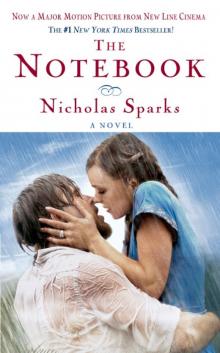 The Notebook
The Notebook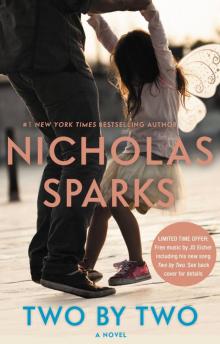 Two by Two
Two by Two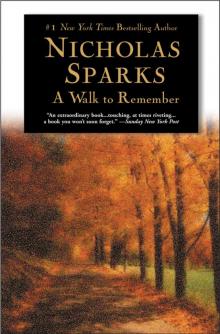 A Walk to Remember
A Walk to Remember The Guardian
The Guardian Dear John
Dear John The Last Song
The Last Song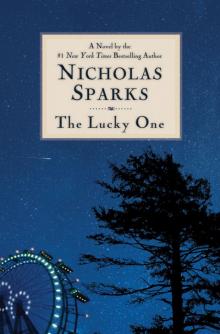 The Lucky One
The Lucky One The Wedding
The Wedding The Longest Ride
The Longest Ride Safe Haven
Safe Haven The Rescue
The Rescue The Wish
The Wish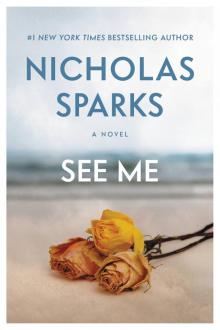 See Me
See Me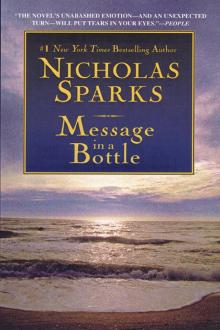 Message in a Bottle
Message in a Bottle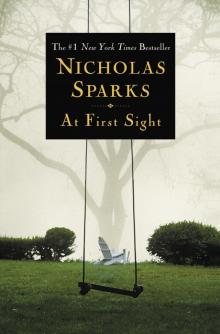 At First Sight
At First Sight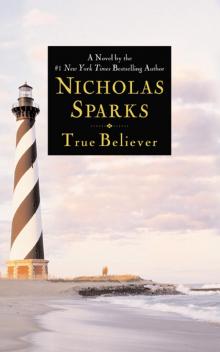 True Believer
True Believer The Return
The Return A Bend in the Road
A Bend in the Road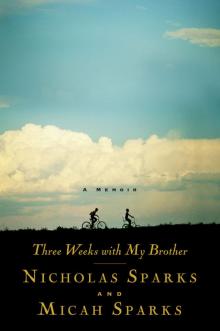 Three Weeks With My Brother
Three Weeks With My Brother Nights in Rodanthe
Nights in Rodanthe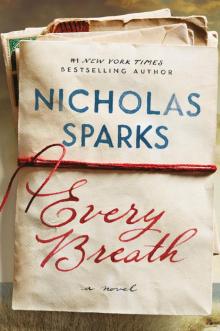 Every Breath
Every Breath